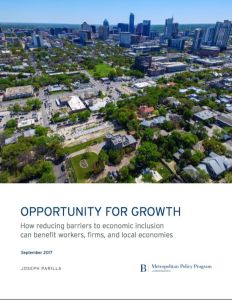Join getAbstract to access the summary!

Join getAbstract to access the summary!
Joseph Parilla
Opportunity for Growth
How reducing barriers to economic inclusion can benefit workers, firms, and local economies
Brookings Institution, 2017
What's inside?
Income inequality is a social issue that also has broad implications for local economies.
Recommendation
This incisive study from public policy expert Joseph Parilla highlights how a relatively narrow slice of the US population reaps the rewards of the nation’s economic growth and prosperity, while the majority of the middle class gets left behind. Parilla argues that inaction at the federal level is leaving state and local governments responsible for promoting inclusive growth. getAbstract recommends this thought-provoking report to entrepreneurs, executives, and state, local, and community leaders.
Summary
About the Author
Joseph Parilla is a fellow at the Metropolitan Policy Program at the Brookings Institution.



















Comment on this summary